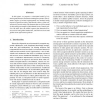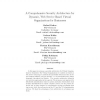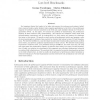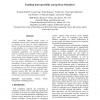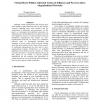GCC
2005
Springer
14 years 5 months ago
2005
Springer
One of the key problems with virtual organizations in the context of the (Semantic) Grid is we don’t know how to describe the components used in virtual organizations because the...
ATAL
2005
Springer
14 years 5 months ago
2005
Springer
A voting protocol for decision-making in virtual organizations is presented. In an agent-based virtual organization the functions of formation, management and dissolution of the o...
HICSS
2005
IEEE
14 years 5 months ago
2005
IEEE
In this paper we propose a conceptual model of virtual organizations as normative multiagent systems. The dynamic aspects of virtual organizations are modeled using aspects of spe...
SWS
2006
ACM
14 years 5 months ago
2006
ACM
In this paper we propose a security architecture for Virtual Organizations for businesses. The Virtual Organizations we consider are based on web service technology to address int...
ESCIENCE
2006
IEEE
14 years 5 months ago
2006
IEEE
An important factor that needs to be taken into account by end-users and systems (schedulers, resource brokers, policy brokers) when mapping applications to the Grid, is the perfo...
HICSS
2008
IEEE
14 years 6 months ago
2008
IEEE
A virtual organization is a temporary network of companies, which implies the potential opportunity to learn and share abundant sources of complementary and compatible knowledge p...
CCGRID
2008
IEEE
14 years 6 months ago
2008
IEEE
Grid computing supports shared access to computing resources from cooperating organizations or institutes in the form of virtual organizations. Resource brokering middleware, comm...
HICSS
2010
IEEE
14 years 6 months ago
2010
IEEE
Although virtual organizations and networks have been studied for quite some time, there is still need for research regarding their inner dynamics and the mechanisms of leadership...

